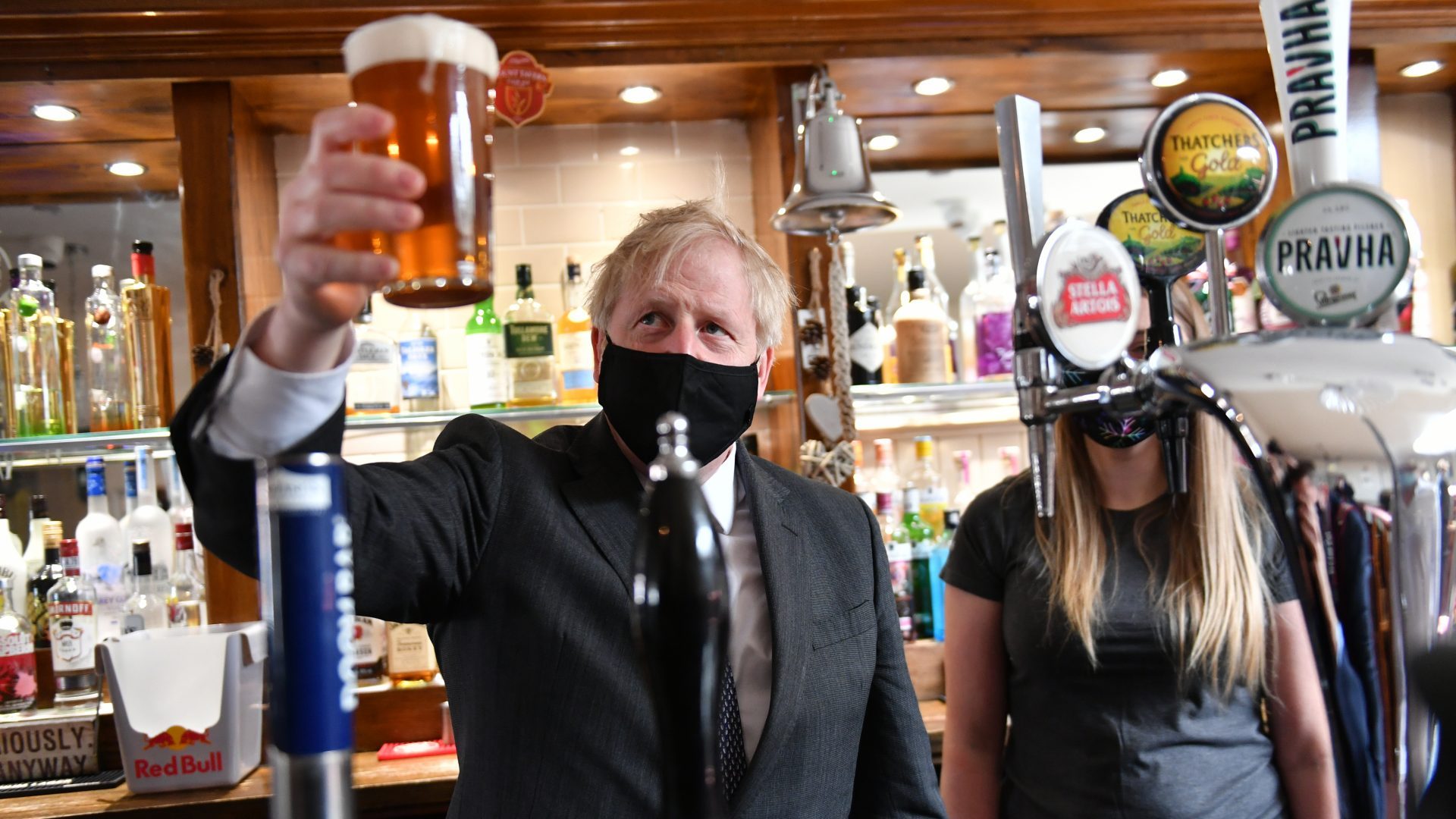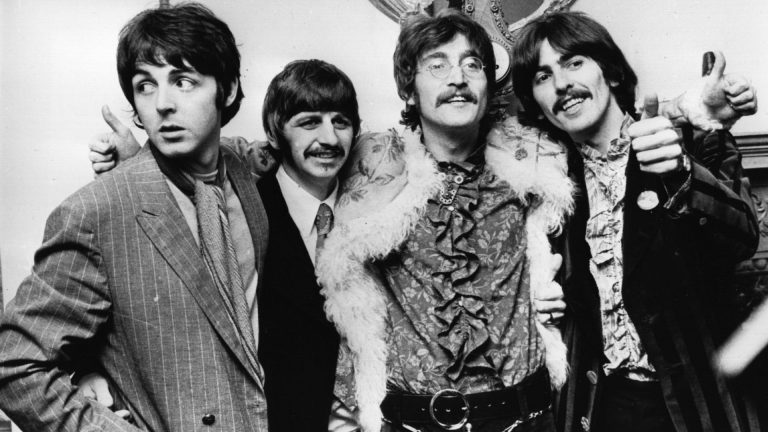Steve Thoburn’s moniker was wrong. The greengrocer from Sunderland who was convicted in 2001 for refusing to sell a bunch of bananas in grams and kilos to a government inspector was dubbed the “Metric Martyr” by a supportive right wing press.
It was a misnomer – you can’t be a martyr in the cause of something you are fighting against. Paul the Apostle, likely murdered on the orders of Emperor Nero, is a Christian not a Roman martyr. But, pedantry aside, are we likely to soon meet Thoburn’s antithesis? Our first “Imperial Martyr”?
This month it was suggested by the government that champagne could be sold in pint bottles in the UK. Apparently they were once popular with Sir Winston Churchill, the former prime minister who is something of totem for Brexiteer politicians, despite the wartime leader being an advocate of “a United States of Europe”.
The request was quickly shot down by champagne producers but it follows on from Boris Johnson’s government announcing last year that it will review laws stating packaged or loose goods such as bananas and chicken wings must be sold in metric measurements. Its “Brexit opportunities” document was obviously intended to appeal to the government’s residual Leave vote base and its yearning for anything that might be considered “sovereign” (or likely “not foreign”).
Once more we’ll be able to sell petrol in gallons (if the forecourts aren’t closed) and humbugs by the quarter. “We will bring back an ancient liberty,” declared Johnson. Former Brexit minister David Frost went further, describing metrification as “unwelcome EU interference in daily life in Britain.”
But as we never needed to leave the EU to have blue passports, the correct crimp on Cornish pasties or to feel a vague stirring of patriotism, we didn’t have to leave the EU to use imperial measures. They were never banned. After all, the UK’s road signs measure distances in miles and we drink pints of beer. One can only imagine how many McDonald’s quarter-pounders Arron Banks has necked.
The law is clear: although traders must offer metric as the more prominent display, there is no legislation to stop prices being shown in imperial measurements nor goods being weighed in them. So what’s it all about? Surely it couldn’t be part of the government’s neverending culture wars?
“Either that or ridiculous imperialist preening. Or both,” says Brendan Hanny a campaigner with European Movement UK. “Only three other nations use imperial measurements.”
Those nations are Liberia, Myanmar and economic powerhouse the United States. But even there, metric is used for medicines, car engine capacities and bottles of wine, just like everywhere else (including the UK). NASA uses metric in nearly all its operations.
In any case, alignment with the UK is unfeasible – a US pint is 16 fluid ounces and a US gallon five pints, among other similarly named units, none of which correspond with UK equivalents.
So if we truly aspire to become Global Britain why re-introduce a system hardly anybody else on that globe uses? To Tony Bennett of Active Resistance to Metrication, that’s not the point (even though really, it is). “It’s about the gradual erosion of British culture,” he says. His group places stickers over metric signage around the country, an act some might consider a form of cultural vandalism.
But one man’s vandal is another’s defender of heritage. As Bennett insists: “Imperial weights and measures are integral to daily life and our written culture”.
Don’t tell him there were riots in the West Country in the 1700s over the imposition of imperial standards, and no celebrations of joyous freedom at an Asda supermarket which experimented selling strawberries by the pound. That’s because nobody noticed.
For something so outwardly trivial, passions run deep. There’s even a metricmartyrs.co.uk website, demanding a pardon for Thoburn (who actually possessed metric scales, he was just making a point). Admittedly it also carries a clip of a woman who believes changing from miles to kilometres would make cars less fuel efficient, but you can’t deny its fervour.
But back to Sunderland. The EU recognised the strength of feeling Thoburn engendered – his prosecution and that of others was ridiculously heavy handed and understandably the public warmed to his role as underdog. In the end it was the EU, rather than HM Government’s trading standards department, which diffused the situation, something unlikely to be acknowledged in today’s rhetoric-fuelled, post-Brexit atmosphere. Pragmatism prevailed.
In 2007 EU industry commissioner Gunter Verheugen announced “there is not now and never will be any requirement to drop imperial measurements” (and there hasn’t been). “I want to bring to an end a bitter battle which in my view is completely pointless,” he finished. And this is the organisation Frost recently described as “overbearing” with “little consideration of the UK national interest.” Some people are never happy. Still Frost is the man who described the crown mark on beer glasses as “an important symbol” to be “embraced”. Has a sense of perspective been lost somewhere?
Verheugen’s could have been the last word on the matter until Brexit came along “and the Tories decided what we needed was another front on the culture wars,” says outgoing Green Party leader Siân Berry.
“Focusing on unfilled job vacancies, empty supermarket shelves, and loss of universal credit, might better deserve their attention,” said Labour MP Jess Phillips. She tweeted of the reintroduction of imperial: “Literally no one has ever raised this with me as an MP. They do however tell me they cannot afford heating, they say they can’t get their disabled kids a school place, they tell me they called the police and no-one came. But sure, a quarter of sweets will solve it.” “Tokenism” sniffed a Times editorial.
One suggestion is that any new law might allow imperial measurements to be used alone without requirement for the metric equivalent to be displayed. This would undoubtedly confuse a population that now widely understands what 500 grams of chicken looks like. More likely the new law will legislate for imperial to be used alongside metric, but that was always the case (the only variation being that imperial might now take prominence if a trader so desires). “The difference is so trivial it can only be a matter of virtue signalling intended to shore up the nostalgic vote,” blogged the UK Metric Association (slogan: For a single rational system of measurement).
Rational? Presumably Johnson’s “ancient liberties” don’t mean we’ll be able to visit the butcher and order 300 pennyweight of sausages or demand an octave of whisky at the local offy. Doubtless your server would ask how many gallons that is (16 for those who care). One imagines our “ancient liberty” to demand a bushel or a barleycorn will be ignored. Not even Jacob “we will never bow our knee to tyranny” Rees-Mogg is demanding we undecimalise our currency – even Tony Bennett is quiet about plans for 240 pence in a pound.
And that is, of course, because it would be bewildering, something that was recognised back in 1875 when prime minister Benjamin Disraeli signed Britain up to the Système International d’Unités to establish a universal system of metric weights and measures. He did so because British industry feared being disadvantaged internationally, hidebound by imperial measurements.
And in 1963, a full eight years before Britain joined the forerunner to the EU, the Weights and Measures Act proposed metrification for the UK and it began to be taught in schools. Although imperial was never outlawed, it was believed it would become an anachronism.
It took the New York Times to point out that “Britain introduced metric itself with no directive from the EU.” The collective memory of Brexiteers, however, is that Brussels forced metrification on an unwilling British public.
Metric never fully superseded imperial in the UK, but practicality won out. The average baby boomer knows weight in stones and pounds, height in feet and inches, but is comfortable with buying apples in kilos and is well acquainted with what a litre of petrol is.
“If the EU had never been invented, we would still be where we are today, a halfway house,” wrote Steven Stewart of the UK Metric Association. Perhaps the obvious solution, perish the thought, is to run both systems in parallel as we have done since the 1960s. Or is compromise a forbidden word in the culture wars of post-Brexit Britain?
So will the Tories really legislate for something already adequately covered in UK law? “They might,” says Hannay, “because with levelling up stuttering and building back better just a soundbite, it’s the kind of nonsense they need to galvanise their core support. Besieged Britain, where everything is always somebody else’s fault.”
Since the 2016 referendum, it’s been posited more than once that Thoburn’s stance was the seed of Euroscepticism that eventually led to the UK’s withdrawal from the EU. “The starting pistol for Brexit,” wrote Sunderland’s Evening Chronicle.
Whether it was that or a mendacious journalist’s bent bananas, chaos theory can explain how a seemingly trivial event has major consequences: a butterfly flaps its wings in Sumatra and a month later there is a hurricane in the Caribbean. Maybe a bunch of bananas in a Sunderland market led to Brexit.
But will the sale in kilos of a pomegranate in Peterborough swing the tide of Euroscepticism the other way? Who will be first to stand up for the humble gram? Our first misnamed “Imperial Martyr”…










